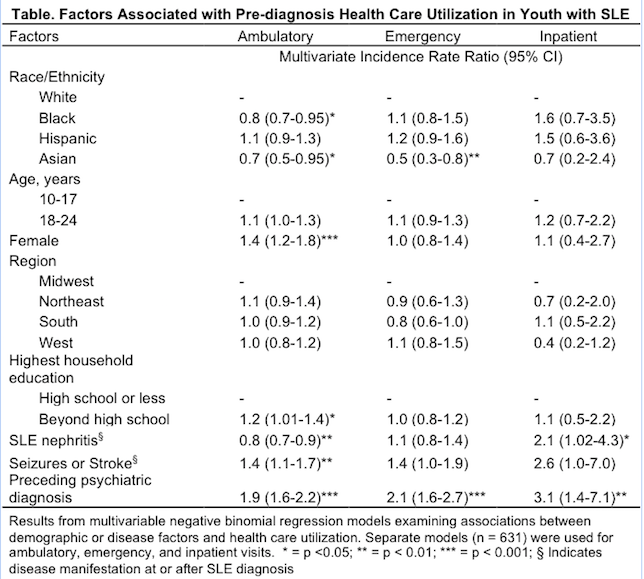Session Information
Date: Friday, May 19, 2017
Title: Plenary Abstract Session 2
Session Type: Abstract Submissions
Session Time: 2:00PM-3:00PM
Background/Purpose: Childhood-onset SLE is associated with high risk for organ damage, which may be mitigated by early diagnosis and treatment. To identify points of health care interaction for potential intervention, we compared pre-diagnosis health care utilization patterns of youth with SLE to those of controls.
Methods: Using US administrative claims (OPTUM) from 2000 to 2013, we identified 682 youth ages 10-24 years with an incident diagnosis of SLE (≥3 International Classification of Diseases, Ninth Revision codes for SLE 710.0, each >30 days apart) and 1,364 controls, matched 2:1 by age and sex. We compared the incidence of ambulatory, emergency and inpatient visits one year before SLE diagnosis, and the frequency of primary diagnosis codes. We examined associations of SLE subject characteristics with pre-diagnosis utilization.
Results: Youth with SLE had significantly more visits in the year preceding diagnosis than controls across ambulatory (IRR 2.48, p<0.001), emergency (IRR 3.42, p<0.001) and inpatient settings (IRR 3.02, p<0.001) (Fig 1). The differences increased as diagnosis approached (Fig 2). Inpatient utilization was greater for SLE subjects with subsequent seizure/stroke and nephritis. Fever, venous thromboembolism, thrombocytopenia, chest pain and acute kidney failure were the most frequent diagnoses in acute care settings. The presence of a psychiatric diagnosis prior to SLE diagnosis was most strongly associated with increased utilization across all settings (Table).
Conclusion: Youth with SLE use significantly more health care in the year preceding diagnosis than peers without SLE, suggesting opportunities for earlier diagnosis, especially among those with neuropsychiatric or renal manifestations.
To cite this abstract in AMA style:
Chang J, Mandell D, Knight A. High Health Care Utilization Preceding Diagnosis of Systemic Lupus Erythematosus in Youth [abstract]. Arthritis Rheumatol. 2017; 69 (suppl 4). https://acrabstracts.org/abstract/high-health-care-utilization-preceding-diagnosis-of-systemic-lupus-erythematosus-in-youth/. Accessed .« Back to 2017 Pediatric Rheumatology Symposium
ACR Meeting Abstracts - https://acrabstracts.org/abstract/high-health-care-utilization-preceding-diagnosis-of-systemic-lupus-erythematosus-in-youth/



